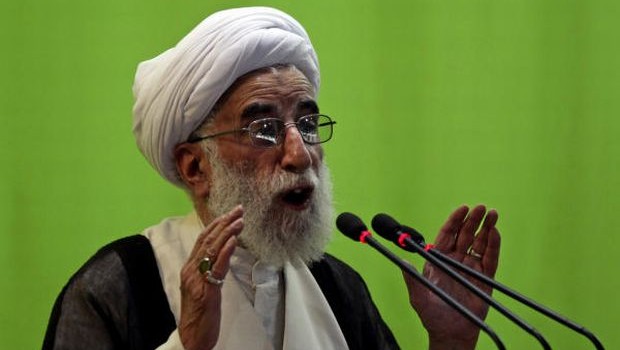
Senior Iranian cleric Ayatollah Ahmad Jannati, secretary of the Guardian Council, Iran’s constitutional watchdog, delivers a sermon at Friday prayers at Tehran University, in Tehran, Iran, on Friday, May 17, 2013. (AP Photo/Vahid Salemi)
“Such claims are just laughable jokes,” he said.
Jannati, who is also the chairman of the Guardian Council, emphasized the strict criteria by which all candidates are being assessed by the Council, which are detailed in Article 115 of Iran’s constitution.
“If we want to have a perfect match with what is prescribed by Article 115, we must ask God to create [such a man] and send him down to us,” Jannati said in a speech broadcast by Iranian state TV. “There is no person available with all these desirable qualities; thus we have to find eligible candidates who meet a minimum set of requirements,” the ayatollah confessed to worshippers yesterday in Tehran.
The Guardian Council has come under immense pressure from various political factions to approve their preferred choice and disqualify opposition candidates.
In a parallel development, Ayatollah Mesbah-Yazdi and his Islamic Resistance Front have intensified their lobbying to ensure their choice, Baqer Lankarani, will have his candidacy approved.
Unconfirmed reports out of Tehran indicate that in the first round of the vetting process, Baqer Lankarani has been disqualified by the majority of the 12-member Guardian Council. There is speculation that this decision was taken because he was judged to not have sufficient managerial skills to take up the presidency.
“I testify in front of Allah that of the registered presidential candidates, Dr. Lankarani is the most suitable,” the Saber news website quoted Mesbah-Yazdi as saying on Tuesday, May 14. (Sabah is a pro-hardliner website close to Ayatollah Mesbah-Yazdi’s faction.)
In early May, the Resistance Front introduced Baqer Lankarani, the former health minister in Ahmadinejad’s cabinet, as its candidate for the June 14 election.
For months leading up to the registration deadline on May 11, the preferred choice for the Resistance Front was said to be Saeed Jalili, Iran’s top nuclear negotiator. But Jalili seems to have rebuffed calls from the Resistance Front led by Mesbah-Yazdi, showing neither interest in running for office or any sense of obligation to do so.
Jalili’s sudden arrival at Iran’s interior ministry only a few minutes before the registration deadline, when Esfandiar Rahim Mashaei and Ali Akbar Hashemi Rafsanjani were also putting down their names for consideration, was seen by great surprise—even by his own, ultra-conservative faction.
In an interview with the Financial Times, Jalili explained that the policies he would pursue if elected are summed up by the words “progress, justice and resistance.”
“My understanding is that more we rely on our religious and internal principles, the more we create the capacity to pursue the path of progress and the more we can resist,” the Financial Times quoted him as saying.
Jalili’s poll ratings are still much lower than other conservative candidates, such as Baqer Qalibaf or Ali Akbar Velayati, but his candidacy is seen with more enthusiasm by foreign observers due to his role in the nuclear negotiations. If elected, his close relationship with Ayatollah Khamenei may go a long way to smoothing out any compromises on the nuclear program, which would have to be approved by the supreme leader.
